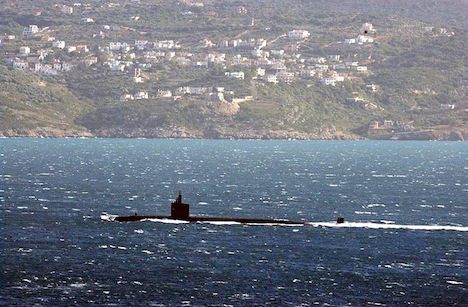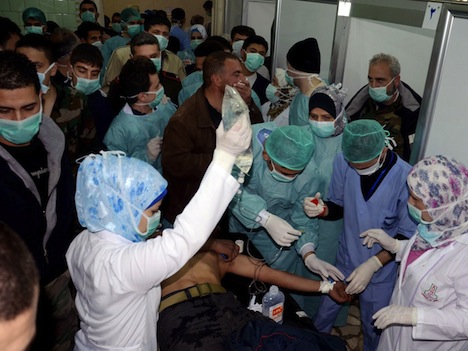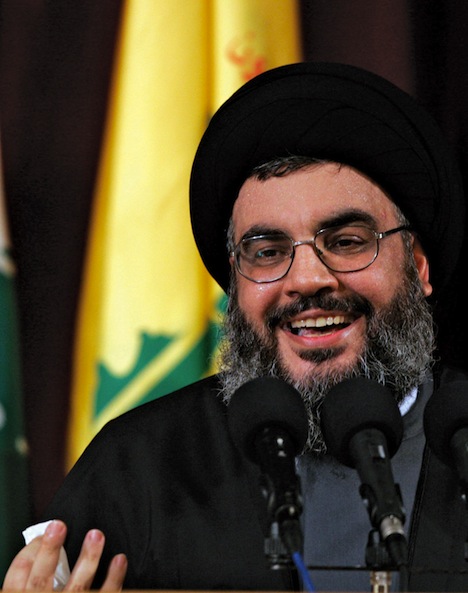The international response to last Wednesday’s chemical warfare attack on the outskirts of Damascus is fast congealing, with U.S., British and French intelligence all pointing to the regime of Bashar al-Assad as the culprit.![]()
![]()
![]()
An official in the administration of U.S. president Barack Obama said Sunday morning that there’s ‘very little doubt’ that Assad perpetrated the attack. French president François Hollande said earlier today that there was ‘a body of evidence indicating that the August 21 attack was chemical in nature, and that everything led to the belief that the Syrian regime was responsible for this unspeakable act.’
Obama and U.K. prime minister David Cameron have discussed the possibility of some form of military intervention, according to The Guardian and other news sources. Meanwhile, the Syrian regime, under pressure from its Russian and Iranian allies, has agreed to allow U.N. weapons experts to inspect the site of the attacks. In a sour irony, U.N. inspectors were already in Damascus earlier this week when the attack occurred for the purpose of determining the extent of potential chemical warfare earlier this spring.
The outset burden on Western governments is to connect the dots to make clear why they believe Assad is responsible — a decade ago, U.S. and British intelligence claimed they had a ‘slam dunk’ case that Iraqi president Saddam Hussein was developing weapons of mass destruction, launching a unilateral attack on what turned out to be incorrect intelligence. If anything, there’s ample evidence in the revelations about PRISM and the Internet snooping by the U.S. National Security Agency that we shouldn’t necessarily take the governments of even liberal democracy at their word.
Remember that the timing of the chemical attacks is incredibly suspicious — Assad’s forces are generally winning via-à-vis the opposition forces in Syria, so it’s not incredibly clear why Assad would order a chemical attack now, especially under the noses of U.N. chemical weapons inspectors. But given the Obama administration’s position that use of chemical weapons is a ‘red line’ that, if crossed, will merit an international response, there’s every reason for opposition forces to use a small-scale attack to try to draw U.S. and European power against Assad, and other radical Sunni elements sympathetic to both the anti-Assad forces and terrorist groups like al-Qaeda are more than happy to bait the West into intervening in the Syrian civil war. But while it’s generally accepted that Assad has access to chemical weapons, it’s far less clear that any of the disparate rebel groups have them or have access to them.
Even if Assad is guilty of what amounts to a war crime, there’s still reason to tread lightly. If Assad is responsible, he should face a wide berth of sanction under international law — those might include further tightening economic and diplomatic sanctions against Assad, his inner circle and the Syrian military, action sanctioned by the United Nations Security Council to destroy Assad’s chemical weapons or destroy his ability to deploy them in the future (including a no-fly zone), a fully empowered U.N. peacekeeping force, and an indictment from the International Criminal Court against Assad and the top military or other Syrian officials directly responsible for the chemical attack.
But even though U.S. defense secretary Chuck Hagel is preparing for ‘all contingencies,’ and U.S. warships in the eastern Mediterranean are already positioning for a potential attack, the international community can still respond in an affirmative way short of immediate U.S.-led military action. Moreover, if Assad were removed tomorrow, Syria would still face a power vacuum, the potential for even more intense fighting between Shi’a/Alawite and Sunni Muslims within Syria and jockeying among various opposition groups, which range from secular Assad opponents to very conservative Islamic fundamentalists. Those are just the known potential downsides for Syria — the unknown consequences and the potential adverse reaction in Iraq, Lebanon and elsewhere in the Middle East are more reason to tread lightly.
The next week is likely to bring even louder calls for the United States and/or the United Nations to act. To do something.
But the challenge for the Obama administration is that foreign policymaking in real time is very difficult, while political soundbytes are as easy as they are worthless. There’s obviously a role for U.S. and international leadership to register a stand for human rights and against crimes of humanity. But don’t trust anyone — in the United Kingdom, in the United States, in the Middle East — who has a ‘clear’ answer in mind for how the international community should now respond.
Don’t let hawks like U.S. senator John McCain convince you otherwise — the response to the latest turn in Syria’s conflict is more complicated than the polar choice of ‘doing nothing’ and launching a U.S.-led attack on Syria, guns-a-blazin’. Given the U.S. history of intervention in the Middle East, and the horrific sectarian violence that followed the U.S.-led removal of Saddam Hussein in Iraq, it would be less controversial for the United Nations — not the United States — to take the lead in the organizing the international response. Also don’t let liberal interventionists try to convince you that the United States should act immediately in order to avoid a Rwanda-style genocide in the Middle East. Though the international community largely stood aside while 800,000 Tustis were hacked to death by Hutus in the 1994 Rwandan genocide, they welcomed the belated French intervention that served to provide relief and refuge to the genocidaires themselves.



